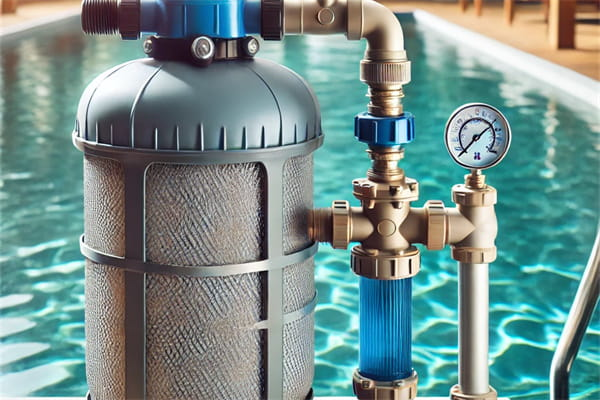Pool sand filters are an essential component in maintaining clean and safe swimming water in various settings. Their applications are incredibly diverse, making them a go-to solution for many water filtration needs. Today, this article will take you through the extensive uses of pool sand filters, demonstrating how to maximize their value and efficiency in different scenarios.
Understanding the Basic Working Principle of Pool Sand Filters

1. Inlet Water:
Pool water is pumped into the filter through an inlet pipe located at the top of the filter tank.
2. Initial Distribution:
The incoming water is dispersed evenly over the top surface of the sand bed by a diffuser or similar mechanism to prevent channeling and ensure uniform flow.
3. Sand Bed Filtration:
The water then percolates downward through the sand bed. The sand grains act as a physical barrier, capturing contaminants and particles as small as 20 microns. This includes dirt, debris, algae, and other impurities.
4. Filtration Mechanism:
As the water moves through the sand, the particles adhere to the rough surface of the sand grains due to mechanical straining and adhesion forces. The sand’s granular structure creates a large surface area for trapping particles.
5. Clean Water Collection:
After passing through the sand bed, the now-clean water reaches the bottom of the filter tank where a set of laterals (small perforated pipes) are located. These laterals collect the filtered water while preventing the sand from escaping.
6. Outlet Water:
The clean water is then channeled through the laterals to an outlet pipe and is returned to the pool, completing the filtration cycle.
Components of a Pool Sand Filter
Understanding the main components of a pool sand filter can help in both selecting the right filter and maintaining it properly. Here are the key parts:
Filter Tank: This is the main body of the filter, typically made of durable plastic or fiberglass. It houses the sand bed and the water.
Sand Bed: The filter media, usually made up of silica sand, is the heart of the filtration system.
Multiport Valve: Located at the top or side of the filter tank, this valve directs the flow of water through different filter operations such as filtering, backwashing, and rinsing.
Laterals: These are small perforated pipes located at the bottom of the filter tank. They evenly distribute the water entering the filter and prevent the sand from escaping.
Pressure Gauge: Indicates the pressure inside the filter tank, helping to determine when a backwash is needed.
Application Scenarios of Pool Sand Filters
Pool sand filters are versatile and find applications in various fields. Here are some of the primary scenarios where they are indispensable:
1.Residential Pools
For homeowners, maintaining a clean pool is essential for health and enjoyment. Pool sand filters are popular in residential settings because they are cost-effective, easy to maintain, and reliable. They ensure that pool water remains clear and free of harmful bacteria and debris.

2.Public Swimming Pools
Public swimming pools see high traffic, making water quality and safety paramount. Pool sand filters are used extensively in these settings to continuously filter large volumes of water, ensuring it meets health and safety standards. Their robust design and efficiency make them ideal for handling the heavy load.
3.Water Parks
Water parks present unique challenges with their high bather loads and various water attractions. Pool sand filters are critical in these environments to maintain water quality across multiple rides and attractions. They help ensure that all visitors enjoy a safe and clean aquatic experience.
4.Aquariums
Large aquariums require meticulous water quality management to provide a healthy environment for aquatic life. Pool sand filters are often used in these setups to remove particulate matter, maintaining water clarity and quality essential for the well-being of fish and other marine animals.
5.Industrial Water Treatment
Beyond recreational uses, pool sand filters are also employed in industrial applications. They are used in processes where water quality is crucial, such as cooling systems and wastewater treatment plants. Their ability to filter out fine particles makes them suitable for these demanding environments.
Conclusion
Pool sand filters are invaluable in a wide range of applications, from residential and public swimming pools to industrial water treatment systems. By understanding their working principles and key components, users can maximize their efficiency and longevity. Whether you are maintaining a small backyard pool or overseeing a large public aquatic facility, pool sand filters offer a reliable and cost-effective solution for clean and safe water.
